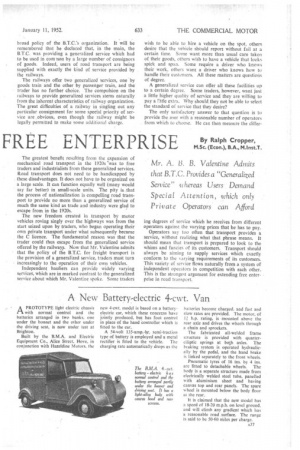A New Battery-electric 4-cwt. Van
Page 55

If you've noticed an error in this article please click here to report it so we can fix it.
A PROTOTYPE light electric chassis
with normal control and the batteries arranged in two banks, one under the bonnet and the other under the driving seat, is now under test at Brighton.
Built by the B.M.A. and Electric Equipment Co., Alice Street, Hove, in conjunction with Hazeldine Motors, ihe new 4-cwt. model is based on a batteryelectric ear, which these conceals have jointly produced, but has foot control in place of the hand controller which is fitted to the car.
A 54-volt 135-amp.-hr. semi-traction type of battery is employed and a metal
rectifier is fitted to the vehicle. The charging rate automatically drops as the
batteries become charged, and fast and slow rates are provided. The motor, of
h.p. rating, is mounted above the rear axle and drives the wheels through a chain and sprockets.
The fabricated all-welded frame structure is provided with quarterelliptic springs at both axles. The braking system is operated hydraulically by the pedal, and the hand brake is linked separately to the front wheels.
Pneumatic tyres of 16 ins, by 4 ins. are fitted to detachable wheels. The body is a separate structure made from electrically welded steel tube, panelled with aluminium sheet and having canvas top and rear panels. The spare wheel is mounted below the body floor at the rear.
It is claimed that the new model has ;a speed of 18-20 m.p.h. on level ground. and will climb any gradient which has a reasonable road surface. The ranac is said to be 50-60 Miles per charge.




















































































